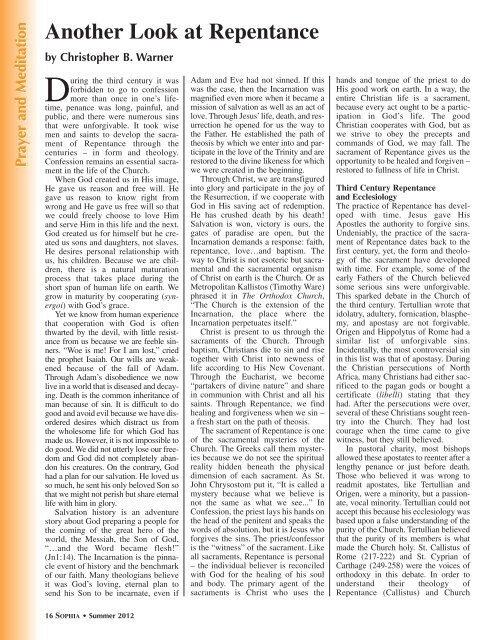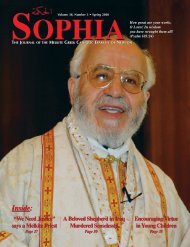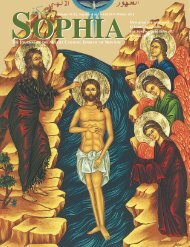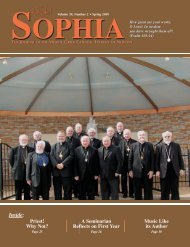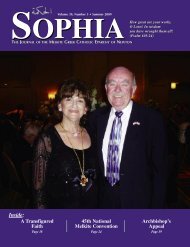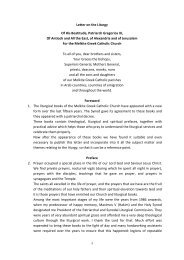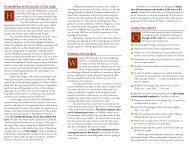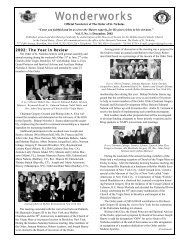Another Look at Repentance - Melkite Eparchy of Newton
Another Look at Repentance - Melkite Eparchy of Newton
Another Look at Repentance - Melkite Eparchy of Newton
- No tags were found...
Create successful ePaper yourself
Turn your PDF publications into a flip-book with our unique Google optimized e-Paper software.
Prayer and Medit<strong>at</strong>ion<strong>Another</strong> <strong>Look</strong> <strong>at</strong> <strong>Repentance</strong>by Christopher B. WarnerDuring the third century it wasforbidden to go to confessionmore than once in one’s lifetime,penance was long, painful, andpublic, and there were numerous sinsth<strong>at</strong> were unforgivable. It took wisemen and saints to develop the sacrament<strong>of</strong> <strong>Repentance</strong> through thecenturies – in form and theology.Confession remains an essential sacramentin the life <strong>of</strong> the Church.When God cre<strong>at</strong>ed us in His image,He gave us reason and free will. Hegave us reason to know right fromwrong and He gave us free will so th<strong>at</strong>we could freely choose to love Himand serve Him in this life and the next.God cre<strong>at</strong>ed us for himself but he cre<strong>at</strong>edus sons and daughters, not slaves.He desires personal rel<strong>at</strong>ionship withus, his children. Because we are children,there is a n<strong>at</strong>ural m<strong>at</strong>ur<strong>at</strong>ionprocess th<strong>at</strong> takes place during theshort span <strong>of</strong> human life on earth. Wegrow in m<strong>at</strong>urity by cooper<strong>at</strong>ing (synergoi)with God’s grace.Yet we know from human experienceth<strong>at</strong> cooper<strong>at</strong>ion with God is <strong>of</strong>tenthwarted by the devil, with little resistancefrom us because we are feeble sinners.“Woe is me! For I am lost,” criedthe prophet Isaiah. Our wills are weakenedbecause <strong>of</strong> the fall <strong>of</strong> Adam.Through Adam’s disobedience we nowlive in a world th<strong>at</strong> is diseased and decaying.De<strong>at</strong>h is the common inheritance <strong>of</strong>man because <strong>of</strong> sin. It is difficult to dogood and avoid evil because we have disordereddesires which distract us fromthe wholesome life for which God hasmade us. However, it is not impossible todo good. We did not utterly lose our freedomand God did not completely abandonhis cre<strong>at</strong>ures. On the contrary, Godhad a plan for our salv<strong>at</strong>ion. He loved usso much, he sent his only beloved Son soth<strong>at</strong> we might not perish but share eternallife with him in glory.Salv<strong>at</strong>ion history is an adventurestory about God preparing a people forthe coming <strong>of</strong> the gre<strong>at</strong> hero <strong>of</strong> theworld, the Messiah, the Son <strong>of</strong> God,“…and the Word became flesh!”(Jn1:14). The Incarn<strong>at</strong>ion is the pinnacleevent <strong>of</strong> history and the benchmark<strong>of</strong> our faith. Many theologians believeit was God’s loving, eternal plan tosend his Son to be incarn<strong>at</strong>e, even ifAdam and Eve had not sinned. If thiswas the case, then the Incarn<strong>at</strong>ion wasmagnified even more when it became amission <strong>of</strong> salv<strong>at</strong>ion as well as an act <strong>of</strong>love. Through Jesus’ life, de<strong>at</strong>h, and resurrectionhe opened for us the way tothe F<strong>at</strong>her. He established the p<strong>at</strong>h <strong>of</strong>theosis by which we enter into and particip<strong>at</strong>ein the love <strong>of</strong> the Trinity and arerestored to the divine likeness for whichwe were cre<strong>at</strong>ed in the beginning.Through Christ, we are transfiguredinto glory and particip<strong>at</strong>e in the joy <strong>of</strong>the Resurrection, if we cooper<strong>at</strong>e withGod in His saving act <strong>of</strong> redemption.He has crushed de<strong>at</strong>h by his de<strong>at</strong>h!Salv<strong>at</strong>ion is won, victory is ours, theg<strong>at</strong>es <strong>of</strong> paradise are open, but theIncarn<strong>at</strong>ion demands a response: faith,repentance, love…and baptism. Theway to Christ is not esoteric but sacramentaland the sacramental organism<strong>of</strong> Christ on earth is the Church. Or asMetropolitan Kallistos (Timothy Ware)phrased it in The Orthodox Church,“The Church is the extension <strong>of</strong> theIncarn<strong>at</strong>ion, the place where theIncarn<strong>at</strong>ion perpetu<strong>at</strong>es itself.”Christ is present to us through thesacraments <strong>of</strong> the Church. Throughbaptism, Christians die to sin and risetogether with Christ into newness <strong>of</strong>life according to His New Covenant.Through the Eucharist, we become“partakers <strong>of</strong> divine n<strong>at</strong>ure” and sharein communion with Christ and all hissaints. Through <strong>Repentance</strong>, we findhealing and forgiveness when we sin –a fresh start on the p<strong>at</strong>h <strong>of</strong> theosis.The sacrament <strong>of</strong> <strong>Repentance</strong> is one<strong>of</strong> the sacramental mysteries <strong>of</strong> theChurch. The Greeks call them mysteriesbecause we do not see the spiritualreality hidden bene<strong>at</strong>h the physicaldimension <strong>of</strong> each sacrament. As St.John Chrysostom put it, “It is called amystery because wh<strong>at</strong> we believe isnot the same as wh<strong>at</strong> we see...” InConfession, the priest lays his hands onthe head <strong>of</strong> the penitent and speaks thewords <strong>of</strong> absolution, but it is Jesus wh<strong>of</strong>orgives the sins. The priest/confessoris the “witness” <strong>of</strong> the sacrament. Likeall sacraments, <strong>Repentance</strong> is personal– the individual believer is reconciledwith God for the healing <strong>of</strong> his souland body. The primary agent <strong>of</strong> thesacraments is Christ who uses thehands and tongue <strong>of</strong> the priest to doHis good work on earth. In a way, theentire Christian life is a sacrament,because every act ought to be a particip<strong>at</strong>ionin God’s life. The goodChristian cooper<strong>at</strong>es with God, but aswe strive to obey the precepts andcommands <strong>of</strong> God, we may fall. Thesacrament <strong>of</strong> <strong>Repentance</strong> gives us theopportunity to be healed and forgiven –restored to fullness <strong>of</strong> life in Christ.Third Century <strong>Repentance</strong>and EcclesiologyThe practice <strong>of</strong> <strong>Repentance</strong> has developedwith time. Jesus gave HisApostles the authority to forgive sins.Undeniably, the practice <strong>of</strong> the sacrament<strong>of</strong> <strong>Repentance</strong> d<strong>at</strong>es back to thefirst century, yet, the form and theology<strong>of</strong> the sacrament have developedwith time. For example, some <strong>of</strong> theearly F<strong>at</strong>hers <strong>of</strong> the Church believedsome serious sins were unforgivable.This sparked deb<strong>at</strong>e in the Church <strong>of</strong>the third century. Tertullian wrote th<strong>at</strong>idol<strong>at</strong>ry, adultery, fornic<strong>at</strong>ion, blasphemy,and apostasy are not forgivable.Origen and Hippolytus <strong>of</strong> Rome had asimilar list <strong>of</strong> unforgivable sins.Incidentally, the most controversial sinin this list was th<strong>at</strong> <strong>of</strong> apostasy. Duringthe Christian persecutions <strong>of</strong> NorthAfrica, many Christians had either sacrificedto the pagan gods or bought acertific<strong>at</strong>e (libelli) st<strong>at</strong>ing th<strong>at</strong> theyhad. After the persecutions were over,several <strong>of</strong> these Christians sought reentryinto the Church. They had lostcourage when the time came to givewitness, but they still believed.In pastoral charity, most bishopsallowed these apost<strong>at</strong>es to reenter after alengthy penance or just before de<strong>at</strong>h.Those who believed it was wrong toreadmit apost<strong>at</strong>es, like Tertullian andOrigen, were a minority, but a passion<strong>at</strong>e,vocal minority. Tertullian could notaccept this because his ecclesiology wasbased upon a false understanding <strong>of</strong> thepurity <strong>of</strong> the Church. Tertullian believedth<strong>at</strong> the purity <strong>of</strong> its members is wh<strong>at</strong>made the Church holy. St. Callistus <strong>of</strong>Rome (217-222) and St. Cyprian <strong>of</strong>Carthage (249-258) were the voices <strong>of</strong>orthodoxy in this deb<strong>at</strong>e. In order tounderstand their theology <strong>of</strong><strong>Repentance</strong> (Callistus) and Church16 SOPHIA • Summer 2012


